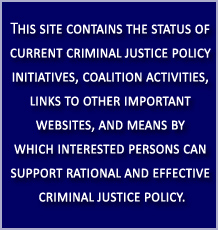
| Join our E-Mail Action Network |

Recent History
Compensating the Wrongfully Convicted In mid-October of this year, the House passed a bill to provide compensation for wrongfully convicted persons. Currently such persons must find a legislator willing to introduce a bill for such relief and persuade a majority of the legislature and the governor to vote in favor of such compensation. Only once (for Bobby Joe Leaster) has this actually happened. Meanwhile numerous citizens have been released from the commonwealth’s prisons after false imprisonment on charges ranging from arson to rape to robbery to murder.
H.2506, introduced by Rep. Patricia. Jehlen (Dem. - Somerville), provides for the court to provide compensation up to $500,000 for persons actually innocent of the crime for which they were incarcerated, court ordered expunging or sealing of relevant criminal and other state records derived from the conviction, and educational, counseling, health, and other services that the commonwealth may provide. Those eligible for relief under this act include those pardoned by the Governor, and those whose conviction has been reversed or vacated and either the indictment dismissed or the DA make a determination not to re-indict. In determining whether to grant such relief, the judge is directed to use discretion to compensate for the passage of time which might impact the availability of witnesses, the reliability of evidence, and other factors not caused by the claimant.
In October, the House passed H. 4166, a version of H. 2506 modified in the House Ways and Means Committee before arriving at the floor for a vote by the entire chamber. The more significant modifications provide for 1) a separate civil proceeding to consider the claim with either party able to request a jury trial; 2) the consideration of evidence seized in violation of the US Constitution’s 4th and 5th amendments, and/or the 12th and 14th articles to the first section of the MA constitution; 3) the Attorney General (and the appropriate county District Attorney) to submit additional testimony, records, documents “or other information” at a time chosen by the AG; 4) limiting any educational benefit to 50% of the cost for tuition and housing; 5) the exclusion of any pre or post interest charges being added to the award; 6) prohibiting the seizure of government property for any award remaining unpaid; and 7) the state the right to challenge expunging/sealing of criminal and/or other records if such expunging might compromise other law enforcement processes.
H. 4166 has itself been relabeled H. 4255 and is now before the Senate Ways and Means awaiting consideration. While this bill has the support members of the staff both at the ACLU and MCLS and of the original sponsor as a step forward, certain questionable issues have been introduced. A) That otherwise inadmissible evidence may be considered may provide yet another invitation to the law enforcement community to intentionally obtain such evidence against such a claim, even where the evidence is barred at the original trial. B) Any leverage that a successful claimant might use (cumulative interest, threatened seizure of state property) to force payment is excised; a claimant unpopular in the public’s eye’s might find obtaining a judgment too burdensome. In a worst case scenario, the claimant might find him/herself needing to work through the existing legislative process with no sure award guaranteed. C) The cutting in half of the educational benefit seems somewhat petty. D) Finally, the ability of the state to profit by maintaining records generated in a faulty prosecution is of dubious merit; conceivably the wrongfully convicted may find him/herself liabled years later due to misuse/abuse of such false records.
15 Barbara Street | Jamaica Plain, MA 02130 | Tel: 617-390-5397 | [email protected]